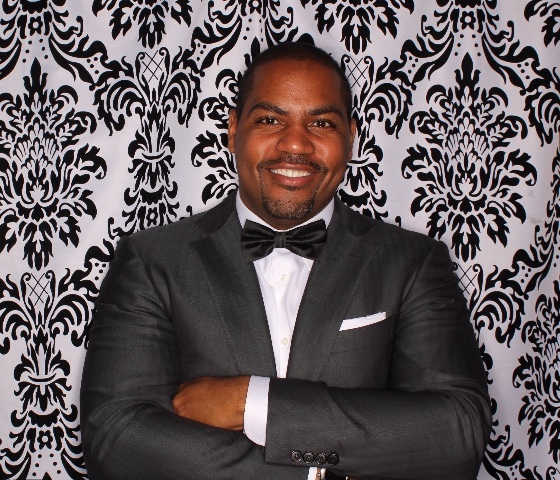
This is a guest post by Jomaree Pinkard, Co-Founder & CEO of Hella Cocktail Co.
Check out our Food & Ag Anti-Racism Resources.
Dear Colleagues,
As a Black Man in business, I have to be extremely careful in both professional and public settings. When I’m trying to make a point, I often have to decide whether I should be direct or performative in my delivery — because my decision, to be honest, can come across as too assertive or even intimidating in the workplace. There is an unwritten rule for black professionals that asks us to speak in a language that others might find more appealing to their sensibilities. In many settings I’ve often had to minimize thoughts to remain poised or what others might deem as “on point,” because my passion in presentation can be mistaken for aggression. If I am too assertive, I can pay the price — and that price can be all too real.
I grew up hearing that I would always need to work twice as hard to get half as much, and keeping these ideas to myself has been over time half the battle. Until today.
For many professionals of color, this sentiment — of minimizing what we know to be real about our lives in business — will ring true. But we also recognize that we can use this moment of societal inflection as an opportunity to actually pivot in business; we can redirect the course for black and brown talent, stories, and industry. We can disrupt how systems have been designed to keep black people in place, silenced, and positioned to avoid risk.
As a black man who grew up in an under-resourced neighborhood in the heart of New York City, I inherently faced nothing but risk and uncertainty daily. I know intimately how challenging it is to break the color barrier in school and at work, when and how I have to prove my worth — and carve out a path toward accessing socio-economic change. In order to find success, black professionals like myself have to put much more on the line to succeed by risking our opportunity to speak, our chance to present, our ability to grow, and our reputations all at once. However, in order to make progress, we must take risks, so here I am putting it all on the line one more time.
I want to state clearly that the system is not failing the status quo — the system is maintaining the exact operation it was designed to uphold. Black people have been maligned in American business for centuries, only given the opportunity to toil and labor, or tend to lower-wage jobs while industry grows more complex and advances. Still, and rarely are Black Americans able to find themselves the business owner. When asked if “my success in the food and beverage industry is the result of drive, hard work, and timing,” I answer “yes” to all three — however, I also recognize that several opportunities have come my way as a result of intentional and deliberate system navigation — challenging the status quo and finding a way in — despite being pushed out, omitted or overlooked, the color of my skin notwithstanding.
Now, in reflection as a successful black entrepreneur and business owner, I recognize that my life, my health, my education and the opportunities that have been afforded me as a result of schooling at the University of Virginia in Charlottesville and The Wharton School of Business are not examples of triumph, but are holes in the system that was designed to hold me back. My success is its failure. American business and industry weren’t designed for me or my family to be healthy or supported, to be highly educated, or to establish an entrepreneurial career with Hella Cocktail Co. The system wasn’t designed for me to raise my family in a flourishing neighborhood, or to support and invest in other black business owners’ dreams and ambitions. It has actually been designed to hold us back, and only now because we are at this juncture in history — might we realize that we have an opportunity, or rather a duty to upend this appalling process.
So the questions I have been pondering and propose to you — the questions the system-owners are now being posed and have to reckon with are these: Will you continue to support a system that is designed to force others to fail? Or will you help to dismantle and redesign it to allow for black and brown people to enter in business unhindered? Will you assist in creating opportunities for black people to develop sustainable business models, create jobs, support families and livelihoods, and invest in black business owners — their dreams and ambitions?
If you are willing and haven’t already begun to explore concrete action items, here are four discrete practices you must do to ensure your platform or business is prepared to support black lives mattering.
Practice #1: Listen, Acknowledge Trauma, & Self-Educate
“The goal isn’t perfection, it’s presence!” “The first step is to show up.” ~ Ashtin Berry
There is no perfect playbook for standing face-to-face with inequity, injustice, and oppression while running a business or an organization. Talking about race, racial violence, racism, and the Black Lives Matter movement is the first step. Embracing the complex history of our country is necessary for us to better understand, heal, and change. There are many resources that can help you better explore the dynamics and the voices at play. Educate yourself on American history — the issues of people of color, women, people with disabilities, LGBTQ+ communities, religious minorities, and other marginalized groups, and understand the compounding effects from challenges faced by individuals and communities who inhabit intersectional identities.
There is a shared trauma that impacts communities, our nation, and everyone’s bottom line. For an example of a business in action, Ben & Jerry’s has done its homework throughout the years while actively participating and taking strong social and political stances. As a leader in today’s world, you are grappling with complex change on many levels while trying to understand human dynamics that can feel untranslatable, conflicting, and often painful to your employees and your customers. We must each dismantle and rebuild the entire system together, or choose to do the work independently, and bring back that new knowledge to our companies to invite change.
Practice #2: Investigate Your Internal Impact
“Equity begins with representation.”
Grocery retailers demand door over door metrics, food and alcohol distributors demand minimum case per week turnover, bars and restaurants fiercely rely on the average cover per seat, and investors don’t even place their bets until they are able to verify any of this historical data to measure traction before investment. Somehow these metrics have been omitted when it comes to diversity and inclusion beyond gender. Our companies and organizations feel the impact of the world around us, whether it is apparent to each individual within our ranks or not. It is necessary for us to respond to the challenges of American history, as well as the current climate, and redesign systems and environments where our employees can not only survive — but thrive.
Large multinational spirit companies need to realize that it’s in their best interest to prioritize a culture that is not only equitable and inclusive — but also responsive to the pressing needs of the communities served with their business. From the busser to the boardroom, it is absolutely paramount that fine dining establishments and large restaurant chains seek opportunities to reflect the diversity of the communities served on all levels. Bon Appetit and Epicurious accepted the resignation of their former editor-in-chief, and admitted to being complicit in ‘tokeniz[ing] many BIPOC staffers and contributors” to make their brands appear more diverse; the company also acknowledged its effort in “dismantling the toxic, top-down culture” by “prioritizing people of color for the editor-in-chief candidate pool…and resolving any pay inequities that are found across all departments.”
Starting with the application and vetting process, and working with those that hold the door open or closed, companies must put themselves in a position to seek out and discover talent that has been left behind or that the organization hasn’t yet had the network to discover. The time to hold your company responsible for this task is now.
Practice #3. Scrutinize Your Community Impact
“Donate AND be active in the life span of your contribution.”
Statistics show that 91 percent of consumers believe brands should do more than make a profit; they should address social or environmental concerns, too. While it is intrinsically the right thing to do, this is also the precise reason why during the current pandemic companies have donated everything from free virtual meeting platforms and wifi for schools to contactless free food and beverage delivery. Communities support business because there is an implicit social contract that the community will patronize your establishment in exchange for you offering the best goods or services — with the condition that you continue to represent the best interest of the community.
But what happens after the special event or ribbon-cutting ceremony is over? Charitable donations to organizations such as Color for Change, The NAACP Legal Defense and Educational Fund, Black Lives Matter, and The National Museum of African American History and Culture, among many others, are undoubtedly and immensely important. However, the reality is that we in the black community are hesitant to believe in these monetary postures because we know these are often one-time donations to clear consciences, and only uphold the status quo in moving forward.
Like all other business initiatives and investments your organization makes, community-directed donations need to be looked at through the lens of a business investment similar to launching a new product, or vertical or brick and mortar location, rather than a bottom-line optimizing tax write-off. In the past week, retailers Target, Walmart, Kroger, and H-E-B and spirits producers Pernod Ricard along with Diageo have begun to either donate or set up internal funds to address racial inequalities and injustice. We are hopeful that these social impact-driven funds won’t simply lean in the direction of one-time investments but will create self-sustainable business practices that facilitate growth of reinvestments in the community.
Practice #4. Provide Access and Investment
“Donations are icing on the cake. The CAKE is what’s most important!”
In the U.S. hospitality industry, 60 percent of the sector is made up of people of color, yet black and brown hospitality professionals occupy less than 7 percent of managerial roles. On the small business front of the food & beverage industry, many venture capital firms are onto their 2nd, 3rd, or 4th venture funds — which means they are only interested in companies that are already hitting the $10 million-plus revenue run rates to deliver on meaningful rates of return. What this really means is that there is truly no small business investing present. Overall, the venture industry’s track record on accessibility when it comes to diversity and race fares even worse: only 3 percent of investment partners and 1 percent of founders of venture capital-backed firms are black.
Each of these sub-segments of the industry has a systemic problem that starts at who is hired for entry-level positions and extends to the investors who serve as limited partners to venture funds. The reality for black talent in business is that barriers to participation emerge in every part of the marketplace: the requirements of an elite or private education, family lineage, pedigree, or upbringing are more important than a stellar resume or previous experience. This has always been the case.
While you must continue to donate to organizations that align with your values, now and more importantly, the primary method to change the systemic barriers to access for black professionals is to invest in black-owned and black-led businesses throughout the industry’s value chain with transparency and accountability. Although they are primarily tech investors, Softbank’s newly announced ‘The Opportunity Growth Fund’ to the tune of $100 million states that they will “only invest in companies led by founders and entrepreneurs of color,” meanwhile, Andreessen Horowitz’ The Talent x Opportunity Fund (TxO)’ for underserved communities “are now looking for black, women, minority founders to invest in.” These moves are more in line with the direction the food and beverage industry should follow.
5 Strategies to Move Your Food, Beverage & Hospitality Industry Business to Equity
Once you’ve built in the basics in your practice, you have set the stage. Next, there are the 5 strategies your business can set in motion so that you are part of the movement, and not just responding to the moment:
1. Build a Continuous Diversity Evaluation Process: Being proactive in fighting racism and bias means creating structures and systems within our own ranks to ensure the voices of all members of our workforce are heard and that the needs of our employees are met. Avoid systematic jargon that checks off the diversity-box. If it sounds like “we will provide anti-racism/bias training” or “we will bring in a third party to help conduct company-wide diversity workshops,” you haven’t finished listening. The system — including how you evaluate and dismantle systemic barriers to participation in your business — needs to be built into the company and reassessed with frequency. It is not a person, it is a process.
2. Commit to Accountability: I propose that all organizations who are now publicly saying that Black Lives Matter demand a similar commitment to holding themselves and their peers accountable by being more transparent about where they are in terms of the diversity of their teams and portfolios, benchmarking themselves against their peers, explaining their strategy, adopting KPIs and milestones, and then sharing their progress in an open and transparent manner. From entry-level merchandisers and restaurant servers to the editor-in-chief and board seats; be accountable with respect to how you operate as a business and seek out opportunities to reflect the diversity of the community. Commit to equity on all levels.
3. Invest Your Donation: Investments create ownership, ladders for progress, and accountability throughout an organization’s entire value chain. Like all other business initiatives organizations make, donations need to be looked at through the lens of a business investment rather than a charitable contribution. Those steps include but are not limited to: cultural and historical research, consumer insights and how they impact your community, the alignment of team values, concept development, idea testing and fit, measurement of successes and failures, and, most importantly, reinvestment. Investments are sustainable and have growth metrics around them. You know the drill.
4. Update Your Investment Thesis: Your investment thesis is an inaccurate overestimation of how rational your investments are. In fact, the thesis is mostly built on the basis of the group’s collective trust. That lack of trust is why investments in black-owned businesses are so low, and why access is non-existent. I challenge VCs and strategic funds to alter their investment thesis, and then invest. Think outside the box.
5. Pledge 15% to a Timeline: Black people in the U.S. make up nearly 15 percent of the population. Commit to investment proportions that align with the population over a 1, 2, and 5-year time horizon.
- Media & Trade: Take a pledge to allocate a minimum of 15 percent of your coverage to black talent and businesses,
- Retail: Take the 15% pledge to allocate a minimum of 15 percent of retail shelf space to black-owned businesses,
- Hospitality: Take a pledge to allocate a minimum of 15 percent of bar and restaurant menu placement to black-owned businesses,
- Beer, Wine & Spirits: Take a pledge to allocate a minimum of 15 percent of your portfolio of investment, innovation and distribution network to black-owned businesses,
- Venture/Strategic Investors: Take a pledge to allocate a minimum of 15 percent of your investment portfolio to fund food, beverage, and hospitality entrepreneurial ventures to black-owned businesses.
In your process, you will make mistakes. It is better to move forward with the intention to dismantle and change the status quo than to stand still and wonder why things are imperfect and unbalanced. That is my charge as well.
While it is true that as a Black Man in business I have been extremely careful in both professional and public settings, I have also opened many of the proverbially closed doors and sat in many of the least desirable seats. My daily journey of attempting to gain access to menu and shelf space, capital, and networks has been difficult; but my story of continuing to navigate a flawed system is still hopeful, despite exhaustion and loneliness.
This isn’t about me alone though, by any means. Nope! It’s about those who don’t have the access, who may not have had the opportunity for higher education, or who may never make enough connections to get into the room where decisions happen. For those of us who have: it is time to listen, learn, and acknowledge the centuries-old trauma of systemic inequity endured by black individuals and communities. It is time to redesign a system that truly values the health, education, careers, and ambitions of black people. It is time to disrupt the old system and immediately commit to more equitable actions: invest money, commit to coverage, pledge space, support black-owned, and reward risk. It’s time to use this moment of inflection as an opportunity to redirect the course for black lives — which have always mattered.
Sincerely,
Jomaree Pinkard | CEO & Co-Founder, Hella Cocktail Co.
This post originally appeared on Medium.
____________________________________
Jomaree Pinkard’s career journey has taken him from helping to develop and implement The Salvation Army’s September 11 World Trade Center Recovery Program to consulting for the NFL. In 2012, he became the Co-Founder and CEO of a minority-owned craft cocktail company, Hella Cocktail Co. In eight years, he and his partners have grown a hobby into a nationally distributed premium-quality food manufacturer producing a line of nonalcoholic cocktail mixers, bitters, and newest innovation Bitters & Sodas that make it easier and more accessible to craft delicious drinks at home or behind the bar. Jomaree is a graduate of the University of Virginia’s McIntire School of Commerce and also earned his MBA from The Wharton School of Business at the University of Pennsylvania.
IG: @jomareepinkard





